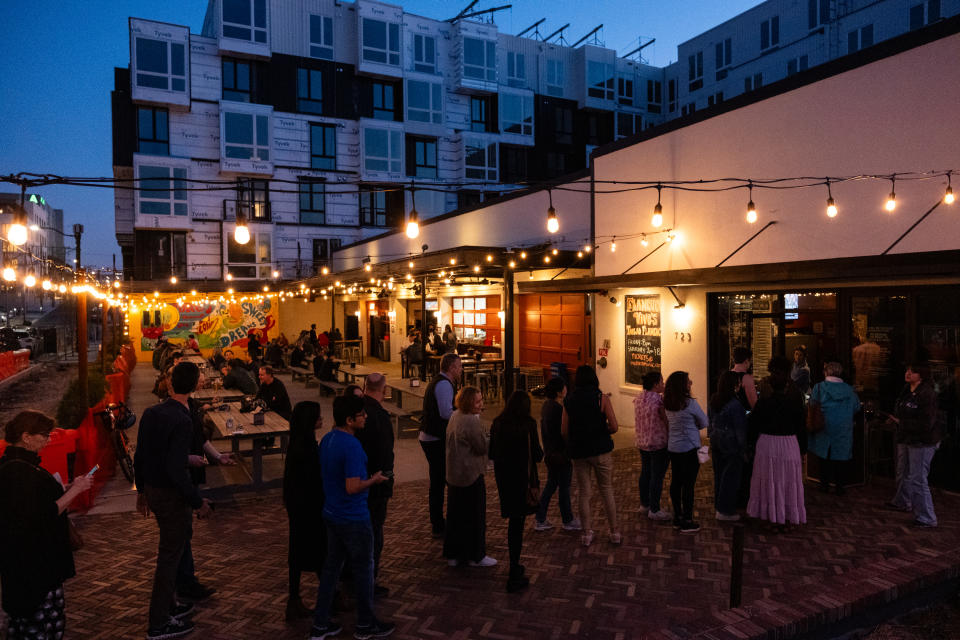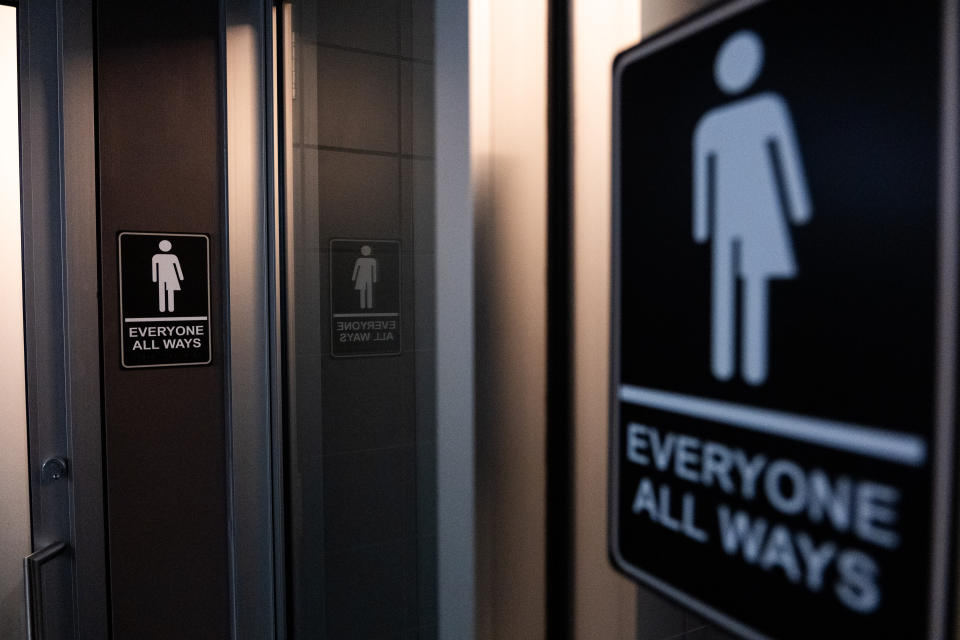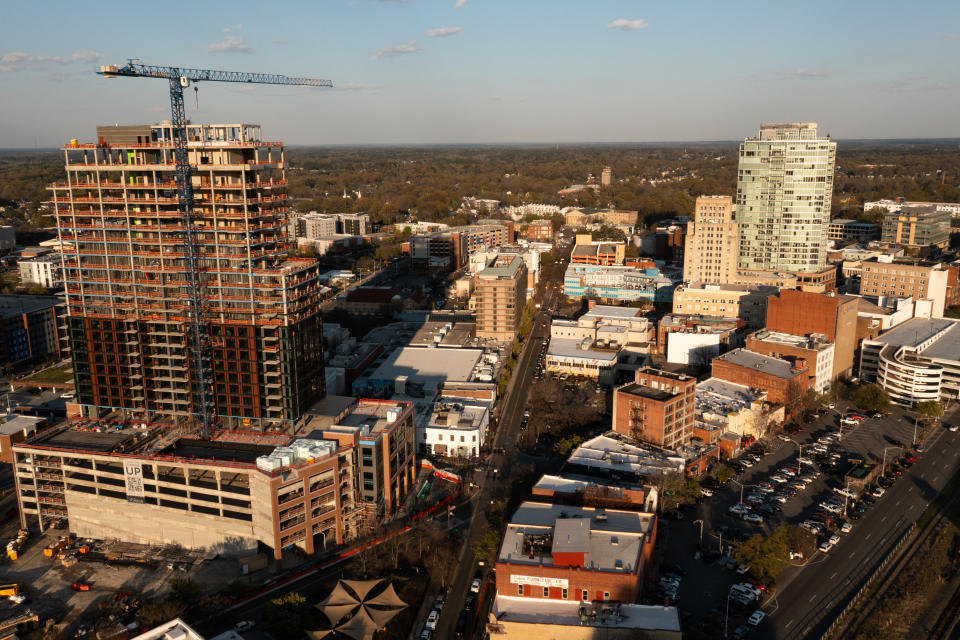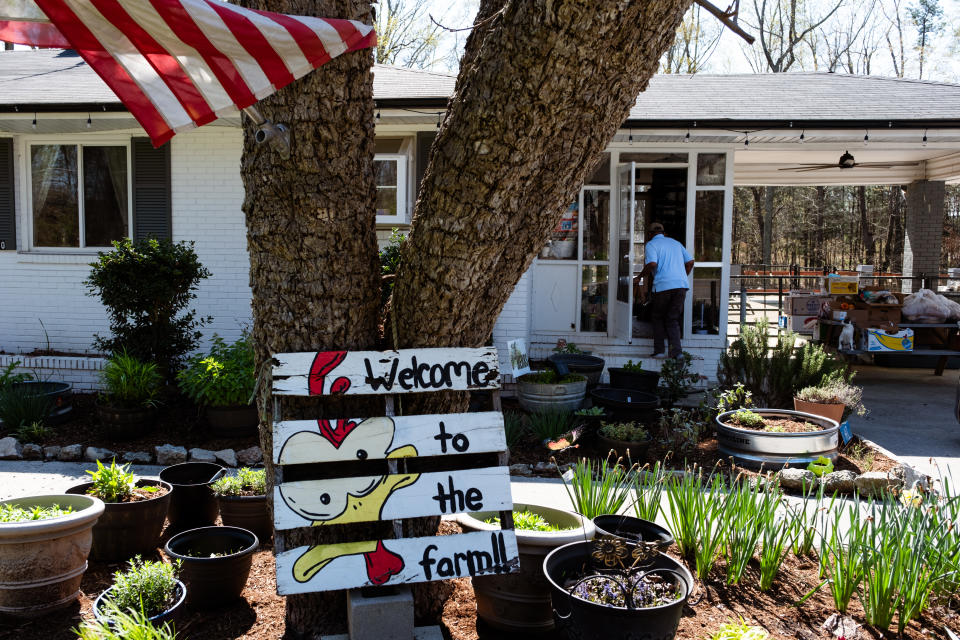DURHAM, N.C. - Taco Tuesday was oddly slow, but Elizabeth Turnbull wasn’t worried. If roasted pork on homemade tortillas failed to lure diners on this pollen-dusted spring evening, the 42-year-old restaurant owner could count on private parties. Three companies had booked her space for next week.
Firms and universities around North Carolina’s Research Triangle buoyed her Cuban eatery when tables otherwise sat empty. With a new Google office in town and Apple projected to expand nearby, she expected group orders for crispy octopus to only grow - as long as politics didn’t get in the way.
Subscribe to The Post Most newsletter for the most important and interesting stories from The Washington Post.
Turnbull, a registered Independent, was alarmed when candidates she viewed as bad for business, all MAGA devotees prone to trumpeting conspiracy theories, recently clinched the Republican nominations for crucial state offices. There was Dan Bishop for attorney general, who had echoed false claims the 2020 election was stolen. There was Michele Morrow for the top education seat, who had commented “Death to ALL traitors!!” under an illustration of former president Barack Obama in an electric chair. And there was Mark Robinson for governor, who had declared that transgender women should be arrested if they enter the ladies’ restroom.
“My ballot is normally purple,” Turnbull said. “But this? It makes me sick.”
As far-right contenders dominate the GOP ticket in a state known for its flourishing economy, the business community is bracing for potential fallout - the kind that stung North Carolina eight years ago when industry rebelled against America’s first “bathroom bill.” That decree, which restricted public restroom use by “biological sex,” crumbled just 12 months later after PayPal, CoStar, Deutsche Bank and Adidas all scrapped projects. Bruce Springsteen and other artists canceled shows. The NBA and the NCAA shuttled games and tournaments elsewhere.
The law’s defenders blamed Democrats for whipping up a national controversy that spooked investment. Backlash to HB2 cost the state almost $4 billion, Gov. Roy Cooper (D) said at the time, citing an analysis by the Associated Press that measured the impact’s 12-year tail. The PayPal deal alone would have contributed more than $200 million annually to North Carolina’s economy, the state’s Commerce Department estimated.
Today, however, Republicans dismiss concerns about a repeat, saying North Carolina is more shielded from culture war blowouts as once-fringe conservatism gains mainstream appeal. Since the HB2 restrictions were lifted, they have pointed out, 10 other states have passed their own bathroom bills.
Yet the demand to embrace inclusivity has swelled, too. The North Carolina Chamber of Commerce rebuked “partisan ideologues that cause division and create controversy” in an unusually biting statement last month, saying the March primary results offer a “startling warning of the looming threats to North Carolina’s business climate.” Officials there did not put a dollar amount on projected losses.
Rhetoric widely condemned as discriminatory could remind executives of the HB2 chaos and chill recruitment efforts, said Michael Walden, an economist at North Carolina State University, who tracked the damage in 2016.
“You lose jobs,” he said. “You lose construction activity. You lose an additional tax base. You lose some prestige.”
Centrism, beloved in boardrooms, is eroding across the country but hanging by a thread in Raleigh, where the Democratic governor adds fragile balance to a Republican legislative supermajority. High-income workers flocking to urban centers have pushed the state left, though not enough to flip power regularly. The November elections could unleash a consequential reset as lawmakers tackle abortion access, education curriculum and LGBTQ rights. Social policy could hold steady, strategists predict, or veer sharply right.
And that, Turnbull thought, could determine if her business blossoms or tanks.
Robinson, the GOP gubernatorial candidate in a tight race, had especially freaked her out. He had climbed from laboring in a furniture factory to serving as the current lieutenant governor, and she could see why people respected that. But why did he have to quote Adolf Hitler on Facebook and refer to homosexuality as “filth?”
Then at one February campaign stop, Robinson charged back into the bathroom fight, asserting he aimed to protect women.
“That means if you’re a man on Friday night, and all of a sudden Saturday you feel like a woman and you want to go in the women’s bathroom in the hall, you will be arrested,” he told a crowd 19 miles southeast of Turnbull’s kitchen, “or whatever we got to do to you.”
Robinson’s team argues he would nourish the economy by cutting taxes, slashing onerous regulations and curbing unnecessary spending, offsetting any upset from his positions on LGBTQ+ issues. Former president Donald Trump has praised Robinson, who is Black, as “Martin Luther King on steroids.”
“As governor, Mark Robinson will not allow men in bathrooms with girls,” Mike Lonergan, Robinson’s communications director, told The Washington Post in an email, reprising the arguments of eight years ago. “Radical leftists,” he added, are “trying to force teenage girls to share bathrooms with men.”
Morrow, meanwhile, shot back against the N.C. Chamber’s disapproval in a statement to The Post, noting that some employers struggle to hire high school graduates with decent reading and math skills. As schools superintendent, she said, she would focus on correcting that issue.
“Have I ever used hyperbole to express my frustration with needless school closures, endless mask mandates and government censorship?” she asked. “Yes, and I did so years before I dreamed of running for office.”
Concerns that he and others in the right’s lineup would curb growth again are overblown, said Dallas Woodhouse, a Republican strategist in Raleigh. Morrow and Bishop did not respond to requests for comment.
“There are certainly cases where they’ve said stuff in the past that is problematic or is easy to take out of context or was done in frustration,” Woodhouse said. “But they’re serious people with serious proposals.”
Turnbull disagreed. Scanning the candlelit bar of COPA, the restaurant she started with her husband in 2018, she mulled what they stood to lose. Like, perhaps, the guy sipping red wine at her quartz counter and typing on a MacBook, whom she had never seen before.
Was he here for a conference, the kind that might again get canceled if transgender people could get arrested for their restroom choice? Or maybe he was one of Google’s fresh hires, who probably had the budget to splurge on three tacos for $15.
The core of COPA’s clientele was “highly educated professionals,” she said, the bracket of spenders Apple was supposed to draw here by the thousands over the next two years. That deal was well underway before Robinson announced his candidacy. But if he won and started signing laws Big Tech detested …
Turnbull recalled then-Gov. Pat McCrory (R) applauding PayPal’s decision to hire 400 workers in Charlotte - only to doom that 2016 plan weeks later by enacting the restroom restrictions.
“There’s a real, tangible ripple effect,” Turnbull said. “We lose our ability to recruit companies and people with the income to eat here.”
In Durham, a college town one of her friends described politically as “a blueberry plunked in tomato soup,” plenty of entrepreneurs mounted their own protests back then, installing gender-neutral stalls with signs that read, “We don’t care.”
Yet the city still lost at least $10 million from called-off conferences and conventions, said Shelly Green, former head of Discover Durham, who led the tourism board through the blowback. “And that accounts only for events we had on the books,” she said, “not the calls we didn’t receive.”
That’s why the city’s Democratic mayor, 43-year-old Leonardo Williams, was already brainstorming ways to ward off another financial blow. Durham’s hospitality industry, he said, had just shaken off the pain of the pandemic. Downtown was humming back to life.
“We don’t need to screw this up,” he said.
Sitting at the Zimbabwean restaurant he owns with his wife, Williams held up a picture on his phone of him and Sheryl Sandberg, who’d scouted sites in town a couple years ago for Meta. Facebook’s parent company soon after confirmed plans to launch a 100-employee office a few blocks away in the old American Tobacco Campus. No move-in date has been unveiled, though.
“Now I’m wondering if they want to wait until after November,” Williams said. (Meta did not respond to The Post’s requests for comment.)
He hesitated to blame Republicans. At the city level, he worked peacefully with Republicans. They celebrated together last July when CNBC named North Carolina the top business state for the second year in a row.
Both sides had “crazies,” Williams said, like the lefties who push to defund the police - a terrible idea for business, he thought.
But Morrow, the GOP candidate for state superintendent, had perpetuated a myth that Jim Carrey, among other actors, drinks the blood of children. And Robinson had criticized school shooting survivors lobbying for stricter gun laws as “media prosti-tots.”
“That stuff isn’t a ‘both sides’ issue,” Williams said. “It’s sane vs. insane.”
So he began drafting invitations to lawmakers and politicos across the state, friends from both sides of the aisle, to stand with him this month as he delivers his State of the City address. The topic: the importance of restoring balance to politics.
“Getting back to being sane,” Williams said.
One name on that guest wish list was Immanuel Jarvis, 47, the former head of Durham’s GOP.
That morning, as Jarvis unlocked his family farm-slash-event space on Durham’s rural outskirts, he noticed the WELCOME banner at the end of his gravel driveway was torn.
If he were, say, a gubernatorial candidate, would the opposition highlight that tattered sign? And the fact that his pool, before its post-winter scrubbing, resembled what he jokingly called the Everglades?
If so, folks might miss that he’d renovated a decaying house into a thriving business. Or that his daughter, now a teacher, had sold enough eggs from the chickens she’d raised here to buy her first car.
“It’s all about what you choose to focus on,” Jarvis said.
Robinson and Morrow, he said, were being judged by snippets circulating on the web, rather than the full context of their proposals. When Jarvis listened to the candidates at length, he heard people who, yes, could be sloppy. But ultimately, he said, he appreciated their vision for North Carolina.
Not that he would defend any comments that have sparked outrage. Rather, he believed, everyone steps in it. As a Black man, he thought it was pretty racist of President Biden to say, “If you have a problem figuring out whether you’re for me or Trump, then you ain’t Black.”
“Was that repeated as much as ‘bloodbath’ has been?” Jarvis asked, referring to Trump’s language on what would come if he lost in November.
So no, he isn’t worried about the economy. Plenty of people, he said, agreed with Robinson and Morrow. They had money to spend, too. The businesses that ditched North Carolina during the bathroom-bill saga, he added, “already had ideology baked into them.”
Firms like Toyota, which hired thousands more workers for a battery plant south of Greensboro last year, weren’t as likely to cave to liberal pressure, he said. (The carmaker does, however, bill itself as a “welcoming space for everyone” and celebrates Pride Month.)
If his schedule allowed, Jarvis said, he would stand with the mayor during “the State of the City” address.
Then he would turn to his blueprint for a fancy new barn on his four-acre property - a great spot for corporate retreats and private parties, he thought, assuming demand stays high.
Related Content
As Florida restricts treatment for trans adults, one clinic presses on
As obesity rises, Big Food and dietitians push ‘anti-diet’ advice
Wes Moore envisioned economic revival. Then the Key Bridge collapsed.












